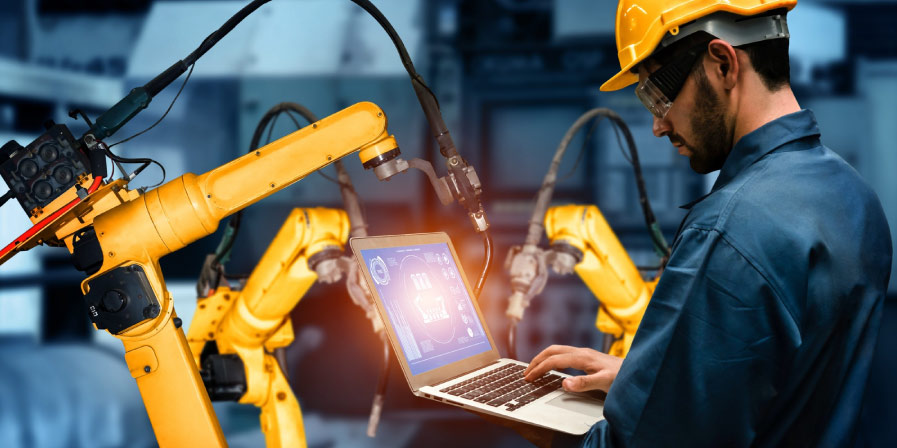 April 17, 2023
April 17, 2023

Industry 4.0 is the fourth industrial revolution characterized by integrating advanced technologies into industrial processes. The impact of Industry 4.0 on industrial processes has been significant, with many positive changes in efficiency, productivity, and quality. CraftedQ discusses the impact of Industry 4.0 on industrial processes in this blog.
Starting from the premise that the introduction of Industry 4.0 into the world is altering the old industrial paradigm of previous centuries, including the twentieth, it is not surprising that such technological deployment has ramifications on various aspects of our daily lives, implying a significant process of adaptation and learning.
The answer to what is Industry 4.0 alludes to “smart” and connected production systems intended to detect, predict, and interact with the physical world to make real-time production choices. It can boost output, energy efficiency, and sustainability in production. It increases output by lowering downtime and upkeep expenses. According to estimates, manufacturing line availability will rise by 5 to 15%. Streamlining provides possibilities for energy savings and sustainability.
Countless manufacturing facilities are already utilizing some Industry 4.0 concepts and technology; you could be one of them. Here, we will take a more in-depth look at what the impact of Industry 4.0 can encompass to help you envision the full potential of this factory of the future:
Integrating automation and robotics into industrial processes has been one of the most significant impacts of Industry 4.0. Automation allows for the automation of repetitive and dangerous tasks, freeing up workers to focus on more complex and creative tasks. Robotics can also improve precision and accuracy in manufacturing, leading to higher-quality products. With the use of automation and robotics, industries can enhance their productivity and reduce their operational costs.
The use of augmented reality and virtual reality technologies has had a significant impact on industrial processes. Industry 4.0 technologies can train workers and simulate production processes, allowing for more efficient and practical training and reducing the risk of accidents and errors. AR and VR have also helped in remote monitoring and remote equipment maintenance, saving time and resources.
The use of cloud computing and the Internet of Things (IoT) has enabled more excellent connectivity and collaboration across the supply chain. This has allowed for greater visibility and transparency into the production process, enabling manufacturers to manage inventory better and reduce lead times.
Another impact of Industry 4.0 on industrial processes is predictive maintenance. Predictive maintenance involves using data and analytics to predict when equipment is likely to fail, allowing care to be carried out before any problems occur. This reduces downtime and maintenance costs while improving the reliability of industrial processes.
This technology creates a virtual copy of a physical system. Industry 4.0 consulting allows for the monitoring and analyzing industrial processes in real-time, allowing for optimization and improvements to be made quickly and efficiently. Digital twin technology can also simulate different scenarios, allowing for better decision-making.
The impact of industry 4.0 has also significantly impacted supply chain management. IoT sensors and other technologies allow for real-time tracking of goods and materials throughout the supply chain. This improves efficiency and reduces the risk of delays and disruptions.
The use of data analytics and machine learning has also had a significant impact on industrial processes. These technologies allow for analyzing large amounts of data, allowing for insights that would be impossible using traditional methods. This can lead to improvements in efficiency, quality, and safety.
Industry 4.0 has also made it possible to customize and personalize products on a large scale. The use of flexible manufacturing systems and 3D printing allows customized products to be produced at a lower cost and with shorter lead times. This can revolutionize the manufacturing industry, allowing for a greater focus on customer needs and preferences.
An Industry 4.0 consulting company refers to integrating advanced digital technologies into industrial processes, including automation, data exchange, artificial intelligence, and the Internet of Things (IoT). The impact of Industry 4.0 on industrial processes can be significant, particularly on an organizational level. Here are some ways that Industry 4.0 can affect industrial processes at the corporate level:
Industry 4.0 technologies can improve the efficiency of industrial processes by automating tasks, optimizing production lines, and reducing downtime. For example, predictive maintenance based on data analytics can help prevent equipment breakdowns, reducing the need for costly repairs and downtime.
With real-time monitoring and data analytics, Industry 4.0 technologies can help identify and address quality issues in real time. This can help prevent defects, reduce waste, and improve product quality.
Industry 4.0 technologies can enable more flexible and adaptive production processes. With the ability to collect and analyze real-time data, organizations can quickly adjust production processes to changes in demand, supply chain disruptions, or other factors.
Industry 4.0 technologies can enable new business models, such as servitization, where companies shift from selling products to offering Industry 4.0 consulting service that support the product’s use, maintenance, and repair. This can create new revenue streams and strengthen customer relationships.
Industry 4.0 technologies can enhance worker safety by automating hazardous or repetitive tasks, providing real-time monitoring and alerts, and reducing the risk of human error.
Industry 4.0 technologies require specialized skills, such as data analytics, machine learning, and IoT, creating new opportunities for skilled workers. Organizations must invest in reskilling and upskilling programs to ensure their workforce has the necessary skills to operate and maintain these technologies.
This is only the beginning of the impact of Industry 4.0, which will be felt on a big scale in the future. For now, the experience of improved manufacturing processes, laborer working circumstances, results, and digitization of information and communication in virtual networks of simultaneous interactions are just the tip of the iceberg. Like to know information on Industry 4.0, reach out to CraftedQ.
